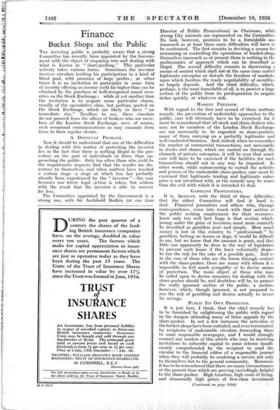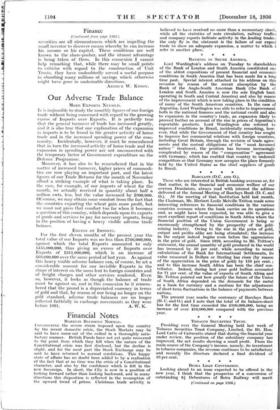Bucket Shops and the Public
Finance
THE investing public is probably aware that a strong Committee has recently been appointed by the Govern- ment with the object of enquiring into and dealing with what is known as "share-pushing." This particular activity takes various forms. Sometimes the investor receives circulars inviting his participation in a kind of blind pool, with promises of large profits ; at -other times it is an invitation to participate in some form of security offering an income yield far higher than can be obtained by the purchase of well-recognised sound secu- rities on the Stock Exchange ; while at yet another time the invitation is to acquire some particular shares, usually of the speculative class, but perhaps quoted on the Stock Exchange, which are likely to have "an immediate rise." Needless to say, these circulars do not proceed from the offices of brokers who are mem- bers of the London Stock Exchange, save, of course, such occasional communications as may emanate from firms to their regular clients.
A DIFFICULT PROBLEM.
Now it should be understood that one of the difficulties in dealing with this matter of protecting the investor lies in the fact that there is nothing illegal in the pro- cedure on the part of individuals or firms thus ap- proaching the public. Only too often those who yield to the importunate requests find that the results are dis- astrous to themselves, and when matters have reached a certain stage—a stage at which loss has probably already been experienced by the "investor "—the case becomes one where legal action is taken, but seldom with the result that the investor is able to recover his loss.
The Committee appointed by the Government is a strong one, with Sir Archibald Bodkin (at one time Director of Public ProseCutions) as Chairman, while strong City interests are represented on the Committee. Its task, however, promises to be a formidable - one inasmuch as at least three- main difficulties will have to be confronted. The first consists hi devising a means for restraining or controlling the operations of bucket-shops themselves inasmuch as at present there is nothing in the preliminaries of approach which can be described as illegal. The second difficulty consists in discovering a means of control which shall not at the same time curtail legitimate enterprise or disturb the freedom of markets, upon which freedom the ready negotiability of securities so largely depends. And the third difficulty, which, perhaps, is the most formidable of all, is to protect a large section of the public from its predisposition to acquire riches quickly, at whatever risk.
MARKET FREEDOM.
With regard to the first and second of these matters, namely, the prevention of undesirable approaches to the public, care will obviously have to be exercised, for it must be remembered that all stock and share-dealers who may not be members of the London Stock Exchange are not necessarily to be regarded as share-pushers, many of them carrying on a perfectly legitimate and well-conducted business. And, indeed, when we remember the number of commercial transactions, not necessarily in stocks and shares, which are carried on through the channels of private enterprise, it will be seen that much care will have to be exercised if the facilities for such transactions should not in any way be impaired. In other words, while endeavouring to curtail the activity and powers of the undesirable share-pusher, care must .be exercised that legitimate trading and legitimate enter- prise is not interfered with, or the remedy may be worse than the evil with which it is intended to deal.'
GAMBLING PROPENSITIES.
It is, however, with the third of these difficulties that the ablest Committee will find it hard to deal. Financial journalists and others who, through correspondence, come into touch with that section of the public seeking employment for their resources, know only too well how large is that section which, posing under the guise of investors, must more correctly be described as gamblers pure and simple. How much money is lost in this country to " professionals " by gamblers, betting on horses or dogs, it would be., difficult to say, but we know that the amount is great, and that little can apparently be done in the way of legislation to prevent such losses if the loser voluntarily desires to run the risk for the sake of a possible gain. And 'so in the case of those who are the losers through contact with the share-pusher, there are many with whom it is impossible to feel much sympathy or to devise means of protection. The main object of those who may be called upon to devise measures for dealing with the share-pusher should be, and doubtless will be, to protect the really ignorant section of the public, a section. however, which, though ignorant, is not prepared to run the risk of gambling and desires actually to invest its savings.
PUBLIC ITS OWN PROTECTOR.
It is just here, I think, that the chief remedy has to be furnished by enlightening the public with regard to the dangers attending many of these appeals by the share-pusher. In not a few instances the activities of the bucket-shops have been curtailed, and even terminated, by recipients of undesirable circulars forwarding them to some responsible newspaper, and I would strongly counsel any readers of this article who may be receiving invitations to subscribe capital to some scheme insuffi- ciently comprehended by the recipient to send the circular to the financial editor of a responsible journal when they will probably be rendering a service not only to themselves but to the general community. Moreover, it has to be remembered that there are many circumstances at the present time which are proving exceedingly helpful to the share-pusher. High taxation, high costs of living, and abnormally high prices of first-class investment
' (Continued on page '1104)'
Finance
(Continued from page 1102.)
• securities are all circumstances which are imPelling the small investor to discover means whereby he can. increase his income or his capital. These conditions are well known to the share-pusher, and the utmost advantage is being taken of them. In this connexion I cannot help remarking that, while there may be small points to criticise with regard to the construction of Unit Trusts, they have undoubtedly served a useful purpose in absorbing many millions of sayings ,which otherwise might have gone in undesirable directions. ARTHUR W. KIDDY.











































 Previous page
Previous page